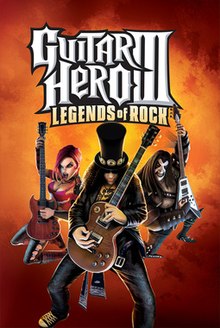
Back غيتار هيرو 3: اساطير الروك Arabic جويتار هيرو اي: ليجيندس اوف روك ARZ Guitar Hero III: Legends of Rock Catalan Guitar Hero III: Legends of Rock German Guitar Hero III: Legends of Rock Spanish گیتار هیرو ۳: اسطوره راک Persian Guitar Hero III: Legends of Rock Finnish Guitar Hero 3: Legends of Rock French Guitar Hero III: Legends of Rock ID Guitar Hero III: Legends of Rock Italian
| Guitar Hero III: Legends of Rock | |
|---|---|
 Cover of Guitar Hero III: Legends of Rock, with Slash in the center and fictional guitarists Judy Nails on the left and Lars Ümlaüt on the right | |
| Developer(s) | Neversoft[a] |
| Publisher(s) | Activision[b] |
| Series | Guitar Hero |
| Platform(s) | PlayStation 2, PlayStation 3, Wii, Xbox 360, Microsoft Windows, Mac OS X |
| Release | PlayStation 2, PlayStation 3, Wii, Xbox 360 Microsoft Windows Mac OS X |
| Genre(s) | Rhythm |
| Mode(s) | Single-player, multiplayer |
Guitar Hero III: Legends of Rock is a 2007 rhythm game developed by Neversoft and published by Activision. It is the third main installment and the fourth overall installment in the Guitar Hero series. It is the first game in the series to be developed by Neversoft after Activision's acquisition of RedOctane and MTV Games' purchase of Harmonix, the previous development studio for the series. The game was released worldwide for the PlayStation 2, PlayStation 3, Xbox 360, and Wii in October 2007. Aspyr published the Microsoft Windows and Mac OS X versions of the game, releasing them later in 2007.
Guitar Hero III: Legends of Rock retains the basic gameplay from previous games in the Guitar Hero series, in which the player uses a guitar-shaped controller to simulate the playing of lead, bass, and rhythm guitar parts in rock songs by playing in time to scrolling notes on-screen. The game, in addition to existing single-player Career modes, includes a new Co-Op Career mode and competitive challenges that pit the player against in-game characters and other players. Guitar Hero III: Legends of Rock is the first game in the series to include an online multiplayer feature, which is enabled in the PlayStation 3, Wii and Xbox 360 versions. Initially the game offers over 70 songs, most of which are master tracks.[4] The PlayStation 3 and Xbox 360 versions feature the ability to download additional songs. The musicians Tom Morello (of the bands Rage Against the Machine and Audioslave) and Slash (of Guns N' Roses and Velvet Revolver) make appearances both as guitar battle opponents and playable characters in the game. The PlayStation 3, Xbox 360 and Microsoft Windows versions also include Bret Michaels (of Poison) as a non-playable character.
Critics and fans acclaimed the game, but reviewers noted a difference in the game's style compared to previous installments, associating it with it being Neversoft's first development attempt with the series. The game is often cited to be too difficult, creating "walls of notes"[5] that are difficult to complete, and led to alterations in note placement for future games in the series. According to Activision, Guitar Hero III: Legends of Rock is the best-selling video game of 2007, both in terms of units sold and revenue earned, and that it is the first single retail video game to exceed one billion dollars in sales. It is one of the best-selling third-party games available for the Wii.
- ^ "Activision Tears It up on Store Shelves with Launch of Guitar Hero(R) III: Legends of Rock" (Press release). Activision. 2007-10-26. Retrieved 2008-12-03.
- ^ "Guitar Hero 3 : Legends of Rock (Bundle — Guitar + Game ) (Mac)". Amazon UK. Retrieved 2008-05-05.
- ^ Cohen, Peter (2007-11-27). "Guitar Hero III for Mac hits stores Dec. 10". Macworld. Archived from the original on 2011-11-14. Retrieved 2008-07-24.
- ^ "Boom in music video games helps original artists". USA Today. Associated Press.
- ^ Tolito, Stephan (2008-04-17). "'Guitar Hero: Aerosmith' Lowdown - Why The Boston Band Is Getting Its Own Game". MTV Canada. Archived from the original on 2008-11-16. Retrieved 2008-04-17.
Cite error: There are <ref group=lower-alpha> tags or {{efn}} templates on this page, but the references will not show without a {{reflist|group=lower-alpha}} template or {{notelist}} template (see the help page).